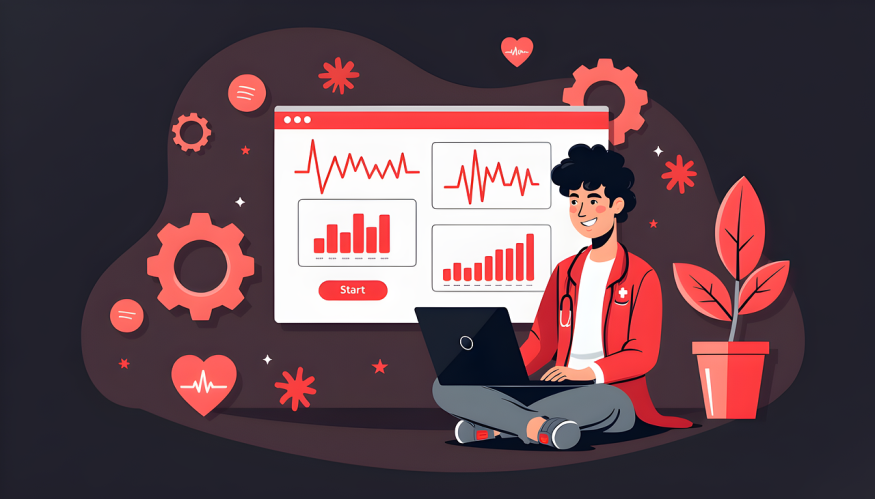Artificial intelligence (AI) in healthcare has emerged as a transformative force, reshaping the medical landscape with innovative solutions that improve patient outcomes and operational efficiency.
Known as AI healthcare or artificial intelligence in medicine, these cutting-edge technologies drive medical innovation by leveraging machine learning to analyze complex data and support clinical decisions.
What Is AI in Healthcare?
AI healthcare refers to the application of algorithms and software to mimic human cognition in medical tasks. Machine learning, a core AI method, enables systems to learn from data patterns without being explicitly programmed. This includes techniques such as deep learning and natural language processing (NLP), which allow AI to interpret medical images, understand clinical notes, and predict patient outcomes.
How Is Machine Learning Improving Medical Diagnosis?
Machine learning has revolutionized medical diagnosis by enabling faster, more accurate disease identification. For example, AI algorithms analyze medical imaging, such as X-rays and MRIs, to detect abnormalities, such as tumors, with greater sensitivity than human radiologists alone. These tools provide real-time support, reducing diagnostic errors and prioritizing urgent cases, thereby allowing timely interventions that save lives.
What Are the Applications of AI Healthcare in Treatment?
AI aids personalized medicine by tailoring therapies to individual patients based on genetic, lifestyle, and clinical data. It also enhances robotic-assisted surgeries with precision and consistency beyond human capabilities. Furthermore, AI-driven drug discovery accelerates the finding of new treatments. Remote patient monitoring systems using AI track chronic conditions and alert healthcare providers to early warning signs, improving long-term management and quality of care.
How Is AI Transforming Healthcare Administration?
Healthcare administration benefits from AI through the automation of routine tasks such as scheduling, billing, and patient record management. Natural language processing tools streamline documentation, freeing clinicians to focus more on patient care. Predictive analytics optimize resource allocation by forecasting patient admissions and staff needs, reducing bottlenecks, and enhancing operational efficiency.
What Are the Benefits of Artificial Intelligence in Medicine?
The integration of AI in medicine has markedly increased diagnostic accuracy, speed, and personalized care. It improves patient engagement through virtual assistants and remote monitoring technologies. These advances reduce healthcare costs by minimizing unnecessary tests and readmissions while improving treatment outcomes. Overall, AI healthcare contributes to smarter, more effective, and accessible medical services.
What Challenges Does AI Face in Healthcare?
Despite its promise, AI healthcare faces challenges, including patient data privacy concerns, integration complexities with existing systems, and ethical issues around decision-making transparency. Regulatory frameworks are evolving to ensure safe and equitable AI deployment. Addressing these challenges is critical to fully realizing AI's potential in medicine.
The Future of Medical Innovation with AI
Looking ahead, AI healthcare innovations will continue to transform medicine through advancements in generative AI, explainable AI, and multimodal data integration. Collaboration between AI technologies and healthcare professionals will foster more proactive, precise, and preventative care models. As AI systems become increasingly sophisticated, they will play an essential role in extending human capabilities, improving outcomes, and driving the future of medical innovation.
AI healthcare and artificial intelligence in medicine represent a paradigm shift in the healthcare industry. By harnessing machine learning, AI technologies are saving lives through enhanced diagnosis, personalized treatment, and operational efficiencies. While challenges remain, the ongoing evolution of AI-driven medical innovation promises a future where healthcare is more intelligent, accessible, and effective for all.
Frequently Asked Questions
1. How do hospitals overcome resistance from healthcare staff when implementing AI systems?
Hospitals address resistance by providing training, involving staff in AI design, and emphasizing that AI supports, not replaces, clinical judgment.
2. What measures are necessary to maintain patient data privacy when using AI in healthcare?
Data privacy is ensured through encryption, strict access controls, adherence to regulations such as HIPAA, and transparent data-use policies.
3. Can AI algorithms in healthcare perpetuate bias, and how can this be avoided?
AI can reflect biases from training data, so careful dataset selection, ongoing monitoring, and fairness-aware techniques are essential to minimize bias.
4. What infrastructure challenges do healthcare facilities face for integrating AI technologies?
Key challenges include ensuring interoperability with legacy systems and adopting standardized data formats and APIs to support seamless AI integration.
© 2026 ScienceTimes.com All rights reserved. Do not reproduce without permission. The window to the world of Science Times.











